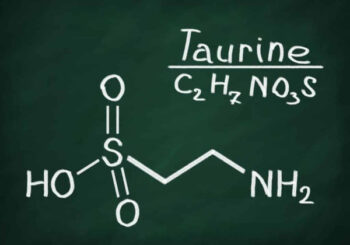Contributing writer for Wake Up World
According to research published in the June 2023 issue of the journal Science,1,2 the semi-essential amino acid taurine appears to play an important role in longevity and healthy aging. In the video above, biohacker and author Siim Land reviews these findings.
Taurine3 has long been known to benefit brain4 and heart health.5 It’s also needed for healthy muscle function,6 bile salt formation7 and antioxidant defenses.8 It protects your antioxidant status by:
- Neutralizing hypochlorous acid, a neutrophil oxidant9
- Diminishing the generation of superoxide by the mitochondria10
- Minimizing oxidative stress,11 including mitochondrial oxidative stress induced by toxins12
Taurine also helps rebuild damaged collagen fibers13 and can help ease anxiety by increasing glycine and GABA.14 Taurine is a byproduct of the sulphurous amino acids cysteine and methionine (technically a sulfonic acid), and is only found in animal foods. Examples of taurine-rich foods include seafood, red meat, poultry and dairy products. It’s also available in supplement form.
Taurine Impacts Longevity
In the featured study,15 an international research team found that oral supplementation with taurine increased the healthy lifespan of a variety of animals. In mice, the median lifespan increased by 10% to 12%. Life expectancy at 28 months was raised by 18% to 25%.
As reported by Science Alert:16
“Scientists have discovered not only that animals age more quickly when they don’t have enough of the amino acid taurine in the body, but that oral taurine supplements can delay aging and increase a healthy lifespan …
‘For the last 25 years, scientists have been trying to find factors that not only let us live longer, but also increase health span, the time we remain healthy in our old age,’ says biologist Vijay Yadav from Columbia University, senior author on the study. ‘This study suggests that taurine could be an elixir of life within us that helps us live longer and healthier lives.’”
Taurine levels decrease by an estimated 80% over the course of the average lifetime,17 and this decline is in part related to a loss of endogenous synthesis capacity over time. Still, the amount of taurine you get from your diet also plays a role. Young healthy vegans, for example, have approximately 20% lower taurine levels than their meat-eating counterparts.18
Taurine Protects Against Hallmarks of Aging
Animals given supplemental taurine didn’t just live longer, they were also healthier overall. In mice, taurine improved:
| Strength, coordination and endurance | Bone mass and bone quality |
| Glucose homeostasis and glucose tolerance | Age-related inflammation |
| Immune function | Gut health |
| Memory | Function of all organs |
| Mitochondrial function and health |
Interestingly, according to the authors, taurine “cured” osteoporosis. It’s not often you see the word “cure” being used in medical literature. Taurine also “suppressed ovariectomy-induced body-weight gain in a rodent model of menopause,” and reduced anxiety and depression-like behavior in the mice.
Treated mice also had less body fat (approximately 10% less at 1,000 milligrams of taurine per day) and higher energy levels. According to the authors, “Fat-pad weight divided by body weight percentage was dose-dependently reduced in taurine-treated mice.” Taurine supplementation also improved several markers of aging, including:
| Senescence | Intercellular communication |
| Telomere length | Epigenetic changes |
| Genomic stability | Mitochondrial function |
| Stem cell populations | Nutrient sensing |
Taurine Effects in Monkeys
Similar effects were observed when feeding taurine to rhesus monkeys. Fifteen-year-old monkeys (equivalent to 45 to 50 years old in humans) were given 250 mg per kg of bodyweight (equivalent to the 1,000 mg/kg given to mice) once a day for six months. As reported by the authors:19
“Before the start of taurine supplementation, body weight and bone density were not significantly different in the two groups of aged monkeys. Three hours after oral feeding, serum taurine concentrations in taurine-fed monkeys were about twice (65.4 ± 10.1 ng/ml) that in controls (35.1 ± 7.3 ng/ml).
Monkeys that received taurine gained 0.75 kg less body weight, and their fat percentage tended to be lower compared with that of controls. In-life dual-energy x-ray absorptiometry (DEXA) analysis after 6 months of taurine treatment showed that taurine increased bone density and content in the lumbar spine (L1 to L4) and legs … in taurine-treated monkeys compared with control monkeys.
Serum markers of bone formation (osteocalcin) increased, whereas those of resorption … decreased about 16 weeks after the start of treatment; these levels were maintained until the end of the dosing period.
Taurine treatment reduced fasting blood glucose concentrations by 19%. Taurine also reduced the serum concentrations of liver damage markers AST and alanine transaminase (ALT) by ~36 and 20%, respectively. Numbers of WBCs, monocytes, and granulocytes, which increase with age, were decreased by ~50% in taurine-treated monkeys compared with control monkeys.
Consistent with the beneficial effect of taurine on the mitochondrial health observed in worms and mice, indirect markers of ROS-induced molecular damage … were decreased by ~36, 11, and 20%, respectively, in the sera of taurine-supplemented monkeys. Thus, taurine has beneficial effects on most tested health parameters (body weight, bone, glucose, liver, and immunophenotype) in nonhuman primates.”
Taurine Deficiency Associated With Chronic Disease
In humans, data suggest people with lower blood levels of taurine have increased risk of several chronic and/or degenerative diseases, including:20,21,22
| Obesity | Diabetes |
| Insulin resistance | Liver disease |
| High blood pressure | Systemic inflammation |
| Retinal degeneration | Heart disease |
| Immune dysfunction | Muscle wasting |
Taurine in the Treatment of Heart Disease and Stroke
Importantly, patients suffering from heart failure tend to be deficient in taurine, which is thought to be related to its ability to improve mitochondrial function and energy metabolism. Restoring taurine levels in these patients has been shown to improve the contractile function of their hearts.23
Stroke victims may also benefit from taurine. As explained in a 2013 paper titled “Neuroprotective Mechanisms of Taurine Against Ischemic Stroke”:24
“Taurine, an endogenous amino acid, exhibits a plethora of physiological functions. It exhibits antioxidative properties, stabilizes membrane, functions as an osmoregulator, modulates ionic movements, reduces the level of pro-inflammators, regulates intracellular calcium concentration; all of which contributes to its neuroprotective effect …
Ischemic stroke (cerebral ischemia) is due to a partial or complete reduction in blood flow to the brain … Insufficient oxygen and glucose supply in cerebral ischemia leads to unsustainable cellular homeostasis which initiates cell injury.
Cellular injury progresses as a result of excitotoxicity, ionic imbalance, oxidative and nitrosative stresses, endoplasmic reticulum (ER) stress and mitochondrial disturbances, ultimately resulting in programmed cell death and necrosis …
Due to the multiple pathophysiological mechanisms observed in ischemic stroke/cerebral ischemia, current treatments remain mostly ineffective apart from thrombolytic therapy which uses thrombolytic recombinant tissue plasminogen activators (rt-PA) such as alteplase. This therapy allows only a 3-4.5 h window for effective treatment.
It therefore becomes critical to develop other compounds that are multipotential in addressing the diverse pathological mechanisms in ischemic stroke/cerebral ischemia …
Taurine is able to cross the blood-brain barrier and displays a plethora of functions in the central nervous system (CNS) … Although taurine is not definitively classified as a neurotransmitter it fulfills most of the necessary criteria …
It modulates neurotransmission by eliciting inhibitory neuronal transmission through GABAA receptors, glycine receptors and putative taurine receptors …The fundamental pathophysiological mechanisms involved in ischemic stroke are glutamate excitotoxicity, calcium imbalance and oxidative stress which individually or collectively results in cell death.
Therefore, taurine’s role as an inducer of inhibitory neurotransmission, an anti-oxidant, neuromodulator, regulator of calcium homeostasis and neuroprotector, potentially makes it an ideal therapeutic agent for ischemic stroke.”
Taurine Involved in Wide Variety of Protective Processes
Taurine may also be an important aid in the treatment of neurodegenerative diseases such as Alzheimer’s and Parkinson’s. The reason for this is because taurine deficiency is associated with endoplasmic reticulum stress,25 a major contributor to prion diseases. Taurine is also thought to be important for proper protein folding.26
Disturbingly, the SARS-CoV-2 spike protein — introduced by natural infection or the mRNA COVID jabs — can pass through the blood-brain-barrier and cause damage resulting in everything from brain fog and dementia to Creutzfeldt-Jakob disease (human mad-cow disease),27,28,29 so taurine may also be valuable in the treatment of COVID, long-COVID and/or post-jab injuries.
Previous animal research30 on mice lacking the taurine transporter also suggests taurine is involved in a wide variety of biologically protective processes, as these mice ended up developing multiorgan dysfunction. This too supports the notion that taurine is a key player in longevity and healthy lifespan.
Taurine Is Important From Cradle to Grave
As noted by the authors of the featured Science study, taurine appears to affect all established hallmarks of aging, making it a veritable fountain of youth:31
“Although we do not yet know the initial events that taurine elicits, we provide evidence for the suppressed taurinylation of mitochondrial tRNAs during aging in mitochondrial dysfunction, a prominent feature of aging.
It is also possible that other taurine-derived biomolecules besides ?m5U-tRNA may directly or indirectly affect mitochondrial homeostasis or other aging features.
Indeed, taurine contributes to the production of several other biomolecules, depending on the cell type or types that affect, or can potentially affect, aging … We propose that a combination of taurine and taurine-derived biomolecules may delay aging by affecting various aging hallmarks in distinct cells and tissues …
[D]uring early life, taurine appears to be essential for homeostasis in several organ systems, and its deficiency during development may compromise these functions postnatally.
Consistent with this hypothesis, organisms have a three- to fourfold higher taurine concentration in embryonic tissues than in adult tissues; moreover, taurine deficiency during development leads to growth retardation, blindness, and osteoporosis, and its supplementation during gestation increased bone mass postnatally …
It is possible that developmental or postnatal changes in taurine metabolism might affect the rate of aging during late life, and adjusting this endogenous machinery might extend healthy life span.”
As mentioned earlier, taurine is found in animal foods such as seafood, red meat, poultry and dairy products, and it’s always best to get your nutrients from your diet.
If you’re a vegan, however, you may want to consider a high-quality taurine supplement, as you’re not getting any from the foods you eat. While your body can synthesize some taurine, it’s not going to be sufficient in the long run, especially as you get older and your body’s ability to synthesize it diminishes.
References:
- 1, 15, 17, 18, 19, 20, 31 Science June 9; 380(6649) DOI: 10.1126/science abn9257
- 2 Science June 8, 2023; 380(6649): 1010-1011, Perspective/Commentary
- 3, 22 Twitter Dr. Eashwarran Kohilathas April 7, 2023
- 4 Nutrients March 2022; 14(6): 1292
- 5 Experimental & Clinical Cardiology 2008; 13(2): 57-65
- 6 Metabolites February 2022; 12(2): 193
- 7 Biocrates Taurine
- 8 Amino Acids June 2012; 42(6): 2223-2232
- 9 Amino Acids January 2014; 46(1): 89-100
- 10 Amino Acids January 2014; 46(1): 47-56
- 11 Mol Cell Biochem May 2016; 416(1-2): 11-22
- 12 Can J Physiol Pharmacol February 2009; 87(2): 91-99
- 13 Tohoku J Exp Med March 2015; 235(3): 201-213
- 14 Anxiety Medication, Taurine
- 16 Science Alert June 12, 2023
- 21 Biomolecules & Therapeutics 2018; 26(3): 225-241
- 23 American Heart Journal June 2002; 143(6): 1092-1100
- 24 Brain Sciences June 2013; 3(2): 877-907
- 25, 26 Adv Exp Med Biol 2015; 803: 481-487
- 27 Prion 2022; 16(1): 78-83
- 28 Cureus February 2023; 15(2): e34872
- 29 Twitter Dr. Eashwarran Kohilathas February 15, 2023
- 30 Nutrients 2017; 9(8): 795
About the author:
Born and raised in the inner city of Chicago, IL, Dr. Joseph Mercola is an osteopathic physician trained in both traditional and natural medicine. Board-certified in family medicine, Dr. Mercola served as the chairman of the family medicine department at St. Alexius Medical Center for five years, and in 2012 was granted fellowship status by the American College of Nutrition (ACN).
While in practice in the late 80s, Dr. Mercola realized the drugs he was prescribing to chronically ill patients were not working. By the early 90s, he began exploring the world of natural medicine, and soon changed the way he practiced medicine.
In 1997 Dr. Mercola founded Mercola.com, which is now routinely among the top 10 health sites on the internet. His passion is to transform the traditional medical paradigm in the United States. “The existing medical establishment is responsible for killing and permanently injuring millions of Americans… You want practical health solutions without the hype, and that’s what I offer.”
Visit Mercola.com for more information, or read Dr. Mercola’s full bio and resumé here.

If you've ever found value in our articles, we'd greatly appreciate your support by purchasing Mindful Meditation Techniques for Kids - A Practical Guide for Adults to Empower Kids with the Gift of Inner Peace and Resilience for Life.
In the spirit of mindfulness, we encourage you to choose the paperback version. Delve into its pages away from screen glare and notifications, allowing yourself to fully immerse in the transformative practices within. The physical book enriches the learning process and serves as a tangible commitment to mindfulness, easily shared among family and friends.
Over the past few years, Wake Up World has faced significant online censorship, impacting our financial ability to stay online. Instead of soliciting donations, we're exploring win-win solutions with our readers to remain financially viable. Moving into book publishing, we hope to secure ongoing funds to continue our mission. With over 8,500 articles published in the past 13 years, we are committed to keeping our content free and accessible to everyone, without resorting to a paywall.









